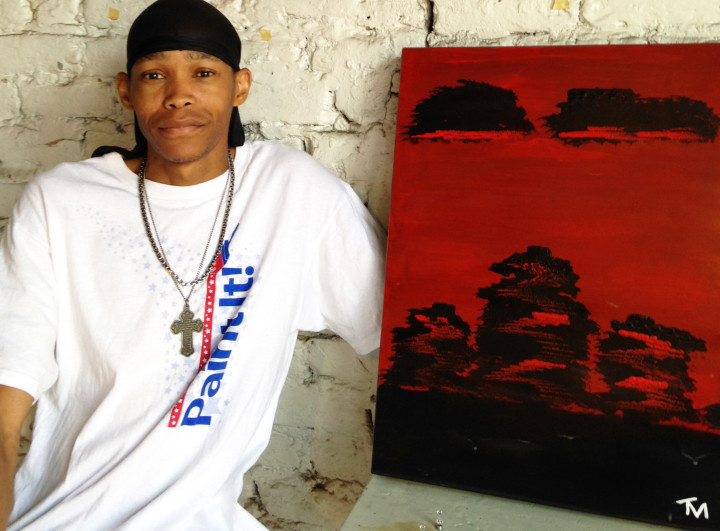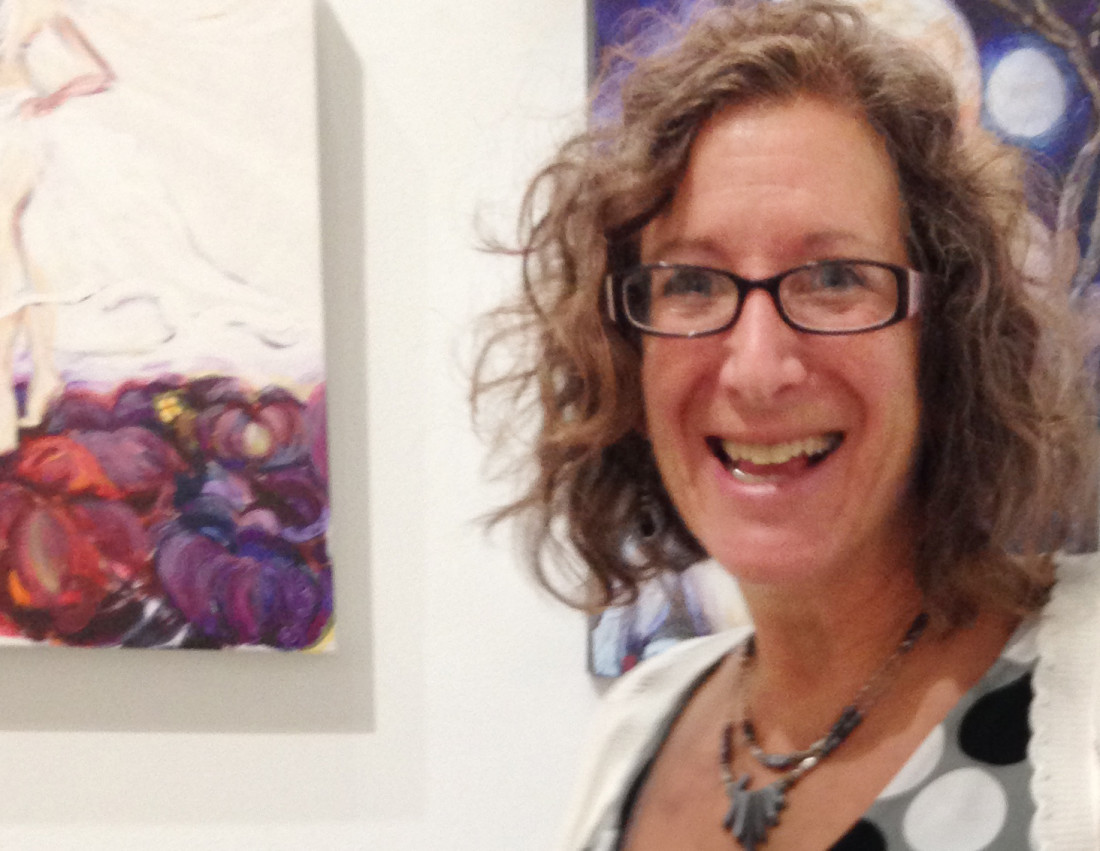While working at a local crisis stabilization and detox facility, Lori Greenberg saw a homeless man clasping his only belongings, his sketchbooks, to his chest. She also saw a destitute woman passing her time in the day room sculpting figures from paper napkins, the only medium left to her. Greenberg understood: “Doing art is what kept her stable.”
With a master’s degree in counseling, Greenberg has worked in human services for more than 30 years. She has led expressive arts programs in New England and knows their therapeutic value.
But Greenberg had never run a business or launched an initiative like the one she thought would benefit “people who were artists, and [living] on the streets.”
She grew up in the 1960s and ’70s, when her parents “never got the memo that ‘women who behave rarely make history.’” She says she was in her in 40s before she “truly had the confidence to start making the big decisions on [her] own.”
Coming to Asheville five years ago was one of those decisions, says Greenberg. But before launching a major project, she thought, “This is Asheville. … There must be some kind of art center that caters to folks struggling with mental health issues, addiction issues.”
Creating
In 2010, Greenberg started looking for such a place. She didn’t find one.
“I listened to what I was hearing, … and I listened to my intuition,” says Greenberg. “It told me to start a collaborative art studio for those in need of support [and] community [and] to work toward creating a holistic center for wellness.”
In 2012, she founded Aurora Studio & Gallery, a program that helps both emerging and experienced artists. Hosted in various locations in its early years, Aurora also generates the mutual support that sustains artists’ psychological well-being, social stability and freedom from addiction, says Greenberg.
Local business owners and partnerships with area nonprofits have proved key to Aurora’s initial success. The program’s first classes took place at a West Asheville store three years ago. A core group of participants collaborated with local artists and healing arts instructors. “We’ve been doing classes ever since,” says Greenberg, “because the feedback from the participants showed that people were really interested, and they kept the momentum going.”
The project has continued to attract participants through word-of-mouth, as well as garner aid from the Asheville Radical Mental Health Collective, the local chapter of the National Alliance on Mental Illness, and local psychotherapists and physicians. Last June, Aurora moved to a downtown space, complete with utility sink and storage, donated by Mountain Lights and Funky Mutt owner Susan Durrence. “She heard about our program, understood the need for alternative support for those who struggle with mental health needs and offered a space above her store that we use for classes one day a week,” says Greenberg.
Infused with Greenberg’s enthusiasm, Aurora has become a magnet for other types of generosity. Asheville artist Jonas Gerard, Roots Hummus and Everyone Cooks have donated paint, paintbrushes, canvases, lunchtime snacks and special-event refreshments. The city of Asheville stepped in, too, with help provided by economic development specialist Brenda Mills. BlackBird Frame & Art offered framing for all the pieces in Aurora’s recent group show, held at the Asheville Area Arts Council. Greenberg notes strong support from AAAC executive director Kitty Love.
“Before the show’s opening reception, the group gathered in a circle to share their intentions for the evening, gain strength from each other and calm any pre-show jitters. Several artists expressed their gratitude for being in Aurora. Another said we could all hold our heads up and be proud of the beautiful show we created.”

Since 2013, Arts2People — under the auspices of former and current directors Jen Gordon and Aaron Johnstone — has acted as Aurora’s fiscal sponsor. “I have been able to network with some amazing organizations and people in Asheville,” says Greenberg.
Sustaining
The Aurora founder is not, by nature, a night owl. But to make her daylight hours available for organizing classes, shopping for supplies and scheduling visiting artists, Greenberg chooses to work the night shift full time, 34 hours packed into three nights a week.
Working nights is exhausting, Greenberg admits. “There are times when I think I can’t do Aurora anymore,” she says. “But I’ve wanted to see how far I could take it. And I love every one of the folks that we have. … It’s been a great group of people, and it’s wonderful to see everybody grow as a person in different ways.”
Aurora has made a positive impact on people’s lives, she says. “Some people were artists, and they could sit and create art, but they were isolated. And they didn’t have any support. What they really needed was the human connection around something that’s important to them and to make friends,” says Greenberg.
“Other people were doing art because it helped them in their recovery, but they didn’t have a lot of training. Those people are gaining support, and they’re getting to learn new skills.”
During a typical two-month session, participants meet weekly in a four-hour class. They begin with a brief check-in and continue with painting, sketching or working with clay. A visiting artist may offer instruction. At the end of each class, participants reflect on their creative process.
“It’s not art therapy,” explains Greenberg. “It’s a supportive community in which people do art.”
From the outset, Aurora participants created their own guidelines: They agree to come to class sober, be nonjudgmental about everyone and their art, respect their own and each other’s feelings, keep confidentiality, follow through with their prescribed mental health treatment, recognize that art is a process, not a destination, and have fun.
Now numbering 10 artists, Aurora Studio is at capacity. Over the course of many sessions, says Greenberg, conversations develop regarding difficult subjects such as medication and relapse prevention. With a bigger group, she says, the program “would lose its intimacy, the ability for people to feel comfortable sharing.”
When Greenberg interviews prospective participants, she doesn’t ask for their diagnosis, letting them “define their needs for themselves. I look for how somebody might need extra support because they’re not able to attain some of their personal goals for either their art or their social functioning. Aurora helps give them that extra boost.”
She adds, “My take on a lot of mental health issues is that there have been multiple traumas in people’s lives, which then manifest in how they learn and how they relate to the world.
“We all go through moments — times of upheaval, anxiety, depression,” Greenberg continues. “But for most of these folks, it’s been more than a moment. It’s been several years, if not their whole lives, that they’ve not been quite able to function in everyday life in a way that meets their own needs.”
Transforming
Themes of safety and friendship thread through participants’ comments about their Aurora experiences. “The environment fostered a feeling of friendship and unity among everybody,” says one woman, who asked to remain anonymous, as several participants did. “So I felt like I could express myself freely without being afraid of judgment.”
Another says, “Since I’ve been in this program, I’ve been able to start another art class that is for the general population. As far as I know, I’m the only person in that class who’s recovering.” She’s been able to talk to the class leader and ask for what she’s needed because she practiced communicating her needs at Aurora, she says. The studio became her “jumping-off point” into the larger world.
“We came together as a group of strangers,” another woman reflects, “and we ended up as friends, people that you look forward to working with. We concentrated on the work, but it was an experience where you knew that people wanted you to succeed. People were encouraging, supportive. It gave me courage and confidence. And I did things I didn’t think I could do.”
“When everyone comes together, there’s energy for witnessing, listening, understanding, respecting,” says Greenberg of the value of art done in community. “That allows people to turn their attention toward creating, and that’s restorative.”
At the moment, Aurora depends entirely upon volunteers, including Greenberg. Continued community support will allow the program to stabilize and grow, she says. Additional funding would enable Aurora to offer classes several times each week and serve more artists who are moving beyond mental illness, addiction and homelessness.
Greenberg, meanwhile, sees herself as an organizer, not an artist. “But I’ve had a huge amount of fun,” she says, “not only having a vision and seeing it come to life but also doing the classes. … So while I’m doing the work of getting this organized, I have a time to play too.”
Any enterprise that provides people in distress a way to save their lives — to bring “something beautiful out of something very dark,” as Greenberg says — meets a pressing need in the community.
Aurora’s recent AAAC opening featured a message from Rita Zoey Chin, author of Let the Tornado Come. A writer and poet, Chin has applied her creative process to resolving the panic attacks that used to paralyze her. She says — and Aurora Studio artists would agree — “art can save your life.”
More Info
Aurora Studio & Gallery
aurorastudio-gallery.com
Loretta’s Café
114 N. Lexington Ave.
A show of small works by Aurora Studio artists continues through Oct. 1.




Before you comment
The comments section is here to provide a platform for civil dialogue on the issues we face together as a local community. Xpress is committed to offering this platform for all voices, but when the tone of the discussion gets nasty or strays off topic, we believe many people choose not to participate. Xpress editors are determined to moderate comments to ensure a constructive interchange is maintained. All comments judged not to be in keeping with the spirit of civil discourse will be removed and repeat violators will be banned. See here for our terms of service. Thank you for being part of this effort to promote respectful discussion.